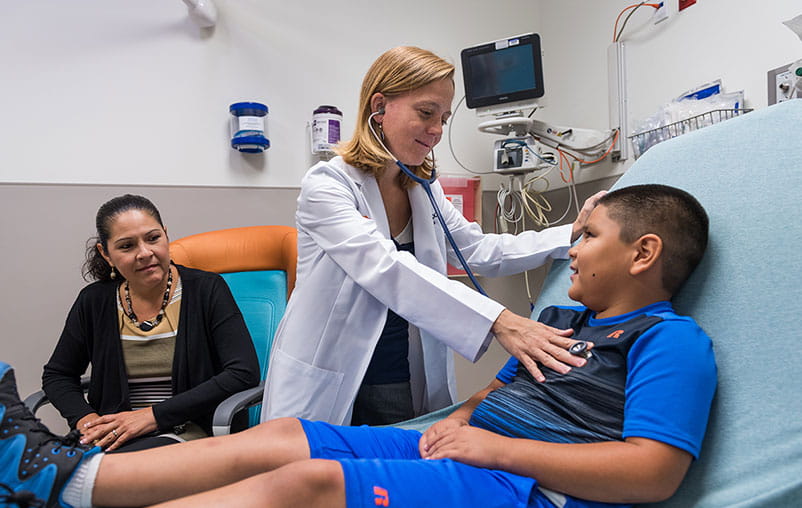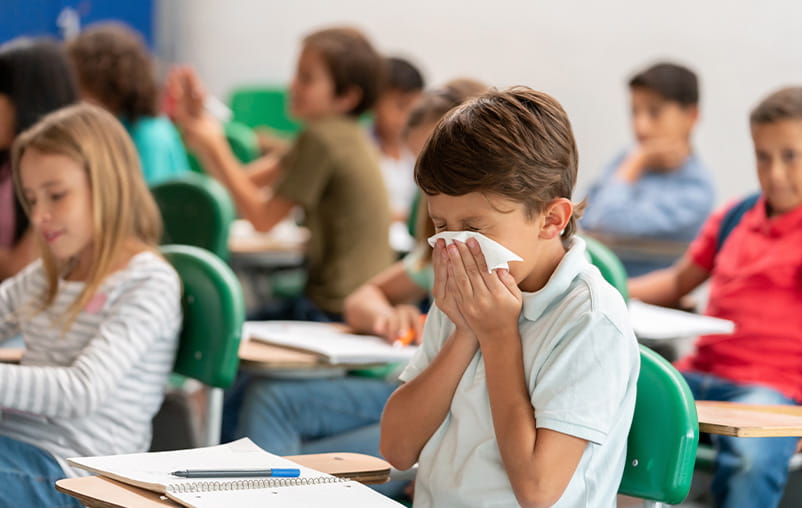Children's Health
From birth through adolescence, children’s genes and environment influence who they’ll become. Learn how to help ensure healthy development and find resources for families and medical professionals.
Pediatric Primary Care & Preventive Health
A child’s pediatrician is their primary source of health care and education until they turn 18. Pediatricians can help keep children healthy with preventive care, like vaccines and screenings. Children should follow a vaccination schedule to stay up to date on their vaccines.
Pediatricians provide other services including:
- Referrals to specialty care when needed
- Sports physicals
- Sick visits
- Well-child checkups
Find more information on the University Health children’s health library.
Child Development
Child development describes how young people grow physically and emotionally. Children’s social, emotional and educational needs must be met for healthy growth and development.
Supporting Child Development
According to the Centers for Disease Control and Prevention, the following factors are important for children:
- Having a safe and loving home
- Getting enough nutrition, exercise and sleep
- Spending time with family ― playing, singing, reading and talking
- Receiving adequate pediatric health care
Find childhood growth and development tips and support on our health library.
According to the U.S. Department of Health and Human Services, the following factors can slow children’s physical and mental development:
- Early life stress, such as physical abuse, family instability, unsafe neighborhoods and poverty
- Exposure to environmental hazards, such as lead in the home
If your family or child needs help, find resources in your area on our website.
Adolescent Health
Adolescence — the transition from childhood to adulthood — is a critical phase of life that includes rapid physical, emotional and social changes. Many external influences that affect health and well-being later in life start during adolescence.
Supporting Adolescent Health
Youth.gov and the U.S. Department of Health and Human Services note that teens and young adults benefit when families, schools and communities:
- Promote supportive adult-child relationships
- Encourage positive health behaviors — like getting preventive care, using birth control and getting enough sleep
- Teach adolescents how to build a sense of confidence in their abilities and perceived control over their behavior and social environment
- Encourage and support involvement with sources of faith and/or cultural traditions
According to Youth.gov:
- Adverse childhood experiences, such as neglect, abuse, poverty and violence, affect a person’s health throughout life
- Childhood or adolescence spent in a neighborhood with little to no economic viability raises the risk of chronic health issues in adulthood
- Marginalized youths, such as racial minorities and lesbian, gay, bisexual, transgender and queer/questioning (LGBTQIA+) teens, face prejudice and discrimination that increase the risk of physical and behavioral health issues
If you’re a parent, explore these essential resources for raising teens.
Child and Adolescent Mental Health
Mental health is an important part of overall health for everyone, including children and adolescents. Mental health issues are treatable with medication or lifestyle adjustments.
As children grow, it may be hard to know if their behavior is a sign of something more serious. Look out for these warning signs in young children:
- Sleep too much or too little
- Aren’t interested in playing with other children
- Have a recent dramatic decline in grades or are struggling academically
- Have frequent tantrums
- Constantly talk about their fears and worries
In older adolescents and teens, these may be signs of mental illness:
- Having low energy or sleeping too much
- Talking of self-harm or suicide
- Using drugs, drinking alcohol, smoking
- Engaging in risky behaviors
- Dieting or exercising excessively and hyper fixating on their weight or body image
If you or someone you know needs immediate help, call or text 9-8-8.
Children's Mental Health Resources
Clarity Child Guidance Center is a nonprofit mental health treatment center for children ages 3 to 17 in South Texas. When a child is in crisis, they work with families to ensure they receive the necessary treatment, regardless of their ability to pay.
Find mental health resources for children and adolescents on our website.
Parenting Resources
Texas Health and Human Services wants to help parents and their children connect through its Get Parenting Tips program. Parents and caregivers can find advice covering a wide range of topics, including child development and establishing healthy habits.



